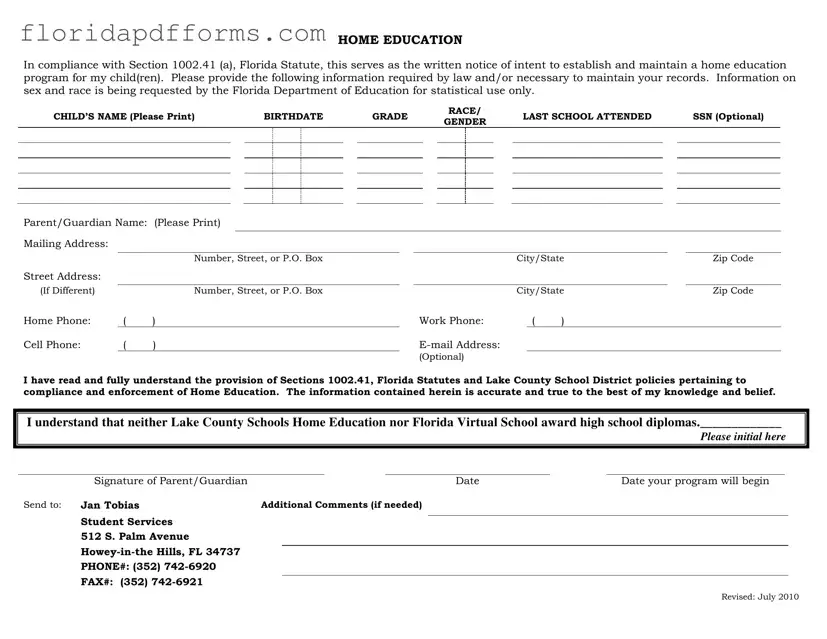The Intent to Homeschool Florida form shares similarities with the Enrollment Form used by traditional public schools. Both documents require essential information about the student, such as name, birthdate, and grade level. The Enrollment Form serves as a means for schools to gather necessary data to create student records and ensure compliance with state education regulations. Like the Intent to Homeschool form, it emphasizes accuracy and the provision of specific personal information, which is crucial for maintaining educational standards.
Another document comparable to the Intent to Homeschool form is the Private School Enrollment Form. This form is utilized by private institutions to officially register students. It typically requests similar details, including the child's name, birthdate, and previous school attended. Both forms aim to establish a formal educational program for the child, ensuring that the school or educational authority has the required information to support the student's learning journey.
The Individualized Education Program (IEP) document is also akin to the Intent to Homeschool form in that it outlines a student's educational plan. While the IEP is specifically designed for students with disabilities, it requires detailed information about the student’s needs and educational goals. Both documents seek to provide a framework for education, ensuring that the specific requirements of the student are met, whether in a home or school setting.
Similarly, the Child Care Enrollment Form used by daycare centers shares characteristics with the Intent to Homeschool form. This form collects vital information about the child, including personal details and emergency contacts. Both forms serve to create a record for the educational institution, helping to ensure the safety and well-being of the child in a learning environment.
The Notification of Intent to Operate a Home School in New York State bears resemblance to Florida's Intent to Homeschool form. Both documents serve as official notifications to the respective state education departments that a parent or guardian intends to educate their child at home. They require similar information, such as the child's name and the parent's contact details, and both aim to comply with state educational laws.
The Application for Admission to a Charter School is another document that aligns with the Intent to Homeschool form. Charter schools require parents to submit this application to enroll their children, which includes basic information about the student. Both forms are designed to establish a formal educational relationship and ensure that the school has the necessary information to facilitate the student’s education.
The Home Schooling Affidavit in some states also resembles the Intent to Homeschool Florida form. This affidavit is a legal document affirming a parent’s intent to homeschool their child, similar to Florida’s notice. Both documents require the parent to provide information about the child and affirm their understanding of the legal requirements associated with homeschooling.
The Student Registration Form used in online education programs shares similarities with the Intent to Homeschool form. Both forms request essential details about the student, including their name, contact information, and educational background. They serve to create a student profile that allows educational programs to tailor learning experiences to meet the individual needs of each student.
Finally, the Notification of Enrollment in a Home School Program form, often required in various states, is akin to Florida's Intent to Homeschool form. This document serves to inform the local education authority of a family's decision to homeschool. It collects similar information, ensuring that the educational authorities are aware of the child's educational status and can provide any necessary support or resources.


